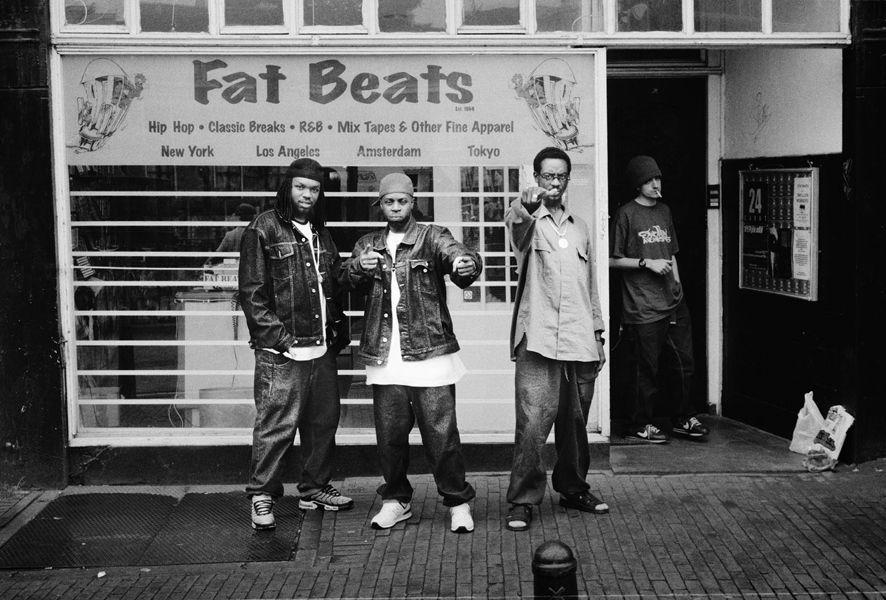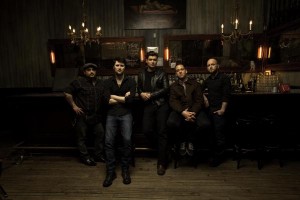- The Cool Kids performing at The New Parish in Oakland
- The Cool Kids recently released their new album When Fish Ride Bicycles
- Chuck Inglish & Sir Michael Rocks are The Cool Kids
By Alex Floro
We had the chance to sit down with The Cool Kids last week at their show at The New Parish in Oakland, CA. Right in the middle of putting their set list together, we found these guys friendly without any airs about them. We discussed their beginnings, new album, flying squirrels, Airsoft wars and finally settle the age old debate: J’s or heels on a girl.
Check out the full interview below:
USD: So how’s your time in Cali been so far?
Sir Michael Rocks: Excellent. Top Notch man, I’ve been here in Oakland a gang of times, and it’s always a good time.
USD: What’s your favorite part about Oakland?
SMR : Aw man, the people. A lot of the fans are out here. The people are dope as fuck.
USD: Fan of any Bay Area artists?
SMR: PFunk over there. Mac Dre, of course. Thizzing everywhere this way and that way. Too Short. All the classics.
USD: How’d you get your name?
SMR : Kindergarten. I don’t know what I was thinking, but I always wanted my name to be Mikey. I’ve always been a big fan of Michael Jordan, you know growing up in Chicago. I wanted to change my name and I started writing it all over my papers. And they told me that I couldn’t change my name and rap came along and I found a way where I could change my name.
USD: Who said you couldn’t change your name?
SMR : Teachers, my mom-
USD: But I bet your mom likes your name now, huh?
SMR: Yea definitely.
USD: I heard that you and Chuck got together through Myspace? How did that all start?
SMR: Man, we really met through a mutual friend we both had, we were both producing. He kinda linked us up because he thought we should meet. I ending up hitting him up through Myspace, messaged him through that and been making music ever since.
USD: Nice, so ever since then you two have been releasing mixtapes and albums. There’s your new album, When Fish Ride Bicyles, the Tacklebox and Gone Fishing tapes, among other. What’s this reoccurring theme with fish?
SMR: There’s gonna be more. We’re gonna save that secret for the end of our career, then ya’ll can put it together .It’ll all come to full circle.
USD: We’ll definitely be waiting for that. Speaking of albums, what was the process for When Fish Ride Bicycles?
SMR : The process was us going to our road manager Rich’s house. Recording in the studio, we’d be going to his crib and just make hella songs. He’d come up with a beat and I would come in later after he cooked it up, then I’d come up with an idea, adding to each of the pieces. So that’s the dynamic, all of us coming together, putting it together piece by piece. Then Green Label Sound asked us who’d we like to collaborate, we told them and it all got started. Nothing awkward, it was great, easy to create.
USD: The label you’ve been recording under is your own, C.A.K.E. What does that mean, or is that another secret we should wait for?
SMR: Nah, that’s us man. Creating Art for Kids Everywhere.
USD: In a recent interview it was said that you worked with Ghostface. How was that? I also read that Raekwon said it was like working in the 90s?
SMR: Man–
Chuck Inglish: No that interview, let me clear that up… Raekwon didn’t work with us, Ghostface did. Raekwon came and hung out with us. But you know, working with Ghostface was like sending something out to someone and seeing what they thought about it. And his verse showed us what he thought about it. It was dope.
USD: On the note of classic artists, you said you both have been inspired by the “Golden Age” of Hip hop, Rakim & Eric B, etc…
SMR: Yea you know that’s the music we grew up with. Our parents were younger than most people’s parents and I grew up listening to rap. Instead of Otis Redding and Barry White, I had to find out about all those artists later. My parents were listening to Slick Rick and Eric B & Rakim, Nas. That’s what I was born into. That was my first taste in music, rap.
USD: You guys are definitnetly known for your style, what’s the craziest thing you’ve ever bought?
In the background: Shown him the Roley!
SMR: Man, that’s not even the craziest. I had an iguana tank and it was like half the size as this wall. And the iguana was small.
CI: The iguana tank was real, but who has fly squirrels?
SMR: I do man.
CI: With an all wood cage.
USD: What are their names?
SMR: Ralph and Lauren.
USD: So Chuck, what’s the craziest you’ve done?
CI: There’s a lot of shit. I definitely went to Walmart and dropped $400 on airsoft pistols.
USD: Did you use them that day?
CI: Yea we got video. He shot me in the face with one!
USD: Aww, how could you shoot your dude in the face!
SMR: Hey we were having an all out war! All’s fair in war.
USD: So who won the war?
SMR: We were having teams. I was on one team, and I was behind the tree and came out, had the pistol and squeezed the trigger and ended up shooting him between the nose. Once you get hit it leaves a cheerio on you.
USD: Haha, well next time we’ll bring some airsoft guns to join the teams. Hey so I’ve been hearing about this super group, P.O.C. (Pulled over Bu The Cops) you formed with Chip the Ripper and Freddie Gibbs?
CI: I mean it was a super group that happened, and some people form groups and never drop songs. We recorded two songs, gave it a name and those songs were dope. Unless we’re all in the same place, I don’t think we should force it. Both songs were crazy. One was Freddie’s songs and the other song was Me, Mikey, and Chip. Like we were all jamming and there was a different sound coming from all of us. So, whenever we meet up again there will be more.
USD: We had a question we came up on the way here, what do you like better on your girl, J’s or heels?
SMR: I need versatility. I can’t always have a girl that rocks the Js. I need her to get fly for me. I’m not trying to cop out on you or anything, but I genuinely prefer both, on different occasions. If we’re going to a family 4th of July party you can throw on J’s.
USD: Which ones do you prefer?
SMR: Hmm, up to number 7, wait, up to number 8.
CI: 9! 8? 11, 13!
SMR: I like them on little feet man. Small 13’s are the best.
USD: So what about you Chuck?
CI: (looks over for a bit) … I like Jordans. (smiles)
Photos by Christian Rabago & Karl Orotea
www.chrissofresh.net
www.fcknsrs.blogspot.com

















Connect: